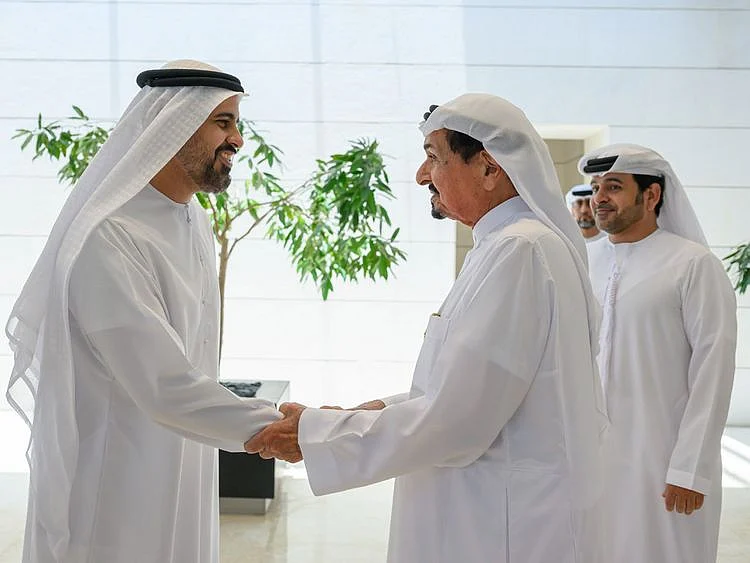UAE: Sheikh Humaid launches Masfout development project in Ajman
Ajman Ruler receives Sheikh Theyab bin Mohamed bin Zayed at announcement ceremony

Ajman: His Highness Sheikh Humaid bin Rashid Al Nuaimi, Supreme Council Member and Ruler of Ajman, launched the Masfout development project at a high-profile reception held at Al Safia Rest House in Musherief area, Ajman.
The event was attended by Sheikh Ammar bin Humaid Al Nuaimi, Crown Prince of Ajman, along with Sheikh Theyab bin Mohamed bin Zayed Al Nahyan, Member of the Abu Dhabi Executive Council and Chairman of the Emirates Council for Balanced Development.
During the launch ceremony, Sheikh Theyab briefed the Ruler of Ajman on the strategic pillars of the Masfout development project, which involves implementing a wide array of innovative development strategies focusing predominantly on cultural tourism, as well as uplifting various facets of society in Masfout.
Sheikh Humaid emphasised that the well-being and happiness of Emiratis and their families across the nation, as well as enhancing their living standards, are priorities for the UAE leadership.
The Masfout development project is the second venture under the Emirates Villages projects launched by the Emirates Council for Balanced Development. The project seeks to foster a sustainable development model and offer economic and investment opportunities that enhance social stability and the quality of life for community members.
Also Read
Dh1 billion ‘Emirates Villages’ project unveiled at UAE Government Annual MeetingsWatch: UAE's National Experts Programme outlines innovative solutions for community in MasfoutAjman’s Masfout area records zero serious crime for second year in a rowIn collaboration with Mubadala and Hub71, the Emirates Council for Balanced Development is set to launch a joint venture aimed at transforming rural villages into thriving centres of innovation and sustainable growth.
Key Initiatives
Digital Healthcare: The project features the inclusion of Alma Health and Dardock to facilitate nursing care at home, supported by Emirates Health Services.
Raising Digital Education Efficiency: The iSchool Foundation will provide comprehensive training to students in AI, augmented reality, and data science. Hub71 will develop entrepreneurial training programs for young people.
Sustainable Agriculture Technology: Herego will offer delivery services for fresh produce, while Coldhubs will provide solar-powered cooling plants to store and preserve fruits and vegetables.
Sustainable Infrastructure Development: Initiatives include a decentralised greywater treatment system, carbon dioxide conversion into rock, and the provision of prefabricated houses made of 85 per cent recycled plastic.
Over the next five years, the Emirates Council for Balanced Development will strive to develop innovative micro-economic models in 10 villages, attract investments, increase private sector participation, and foster cooperation between federal and local governments and the private sector.
Sign up for the Daily Briefing
Get the latest news and updates straight to your inbox
Network Links
GN StoreDownload our app
© Al Nisr Publishing LLC 2026. All rights reserved.